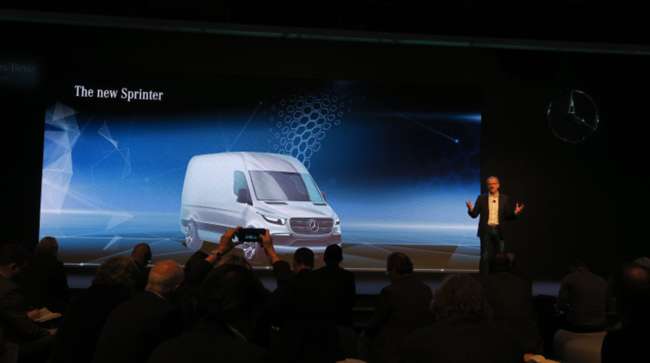Managing Editor, Features and Multimedia
Sprinter Van Redesign Highlights Connectivity, E-Commerce

STUTTGART, Germany — Mercedes-Benz previewed the next iteration of its Sprinter van and highlighted how it is using vehicle connectivity to help customers operate more efficiently and adapt to the demands of e-commerce.
The third generation of the company’s flagship commercial van will be fully connected to the internet through a factory-installed telematics system, transforming the vehicle into a versatile piece of “smart hardware” that can be tailored to suit a vast array of industries, said Volker Mornhinweg, head of Mercedes-Benz Vans.
“The completely reconceptualized Sprinter will be a unique, holistic transport solution: a completely networked van as part of the ‘internet of things’ where we have already written connectivity into the vehicle’s DNA,” he said here Dec. 4 at the company’s 2017 Sprinter Innovation Campus.
A closeup look at one of the interior options for the #newSprinter. #MBVans @mbusa pic.twitter.com/EpX2tZVc1D
— Seth Clevenger (@SethClevenger) December 4, 2017
Mercedes-Benz plans to unveil the new Sprinter in February, with the U.S. market launch targeted for the fourth quarter of 2018.
In addition to its diesel engine options, the new Sprinter will be available with a gasoline engine in the United States, Mornhinweg revealed.
Parent company Daimler AG sells the Sprinter under both the Mercedes-Benz and Freightliner brands in North America.
Since the original Sprinter’s premiere in 1995, sales of the vehicle have exceeded 3.3 million units, Mornhinweg said. That includes more than 142,000 in the first nine months of 2017.
Mercedes-Benz also outlined its plans to electrify its entire lineup of commercial vans.
In Europe, the company will launch its all-electric eVito model in the second half of 2018, followed by the eSprinter in 2019.
Mornhinweg said he wants to bring the electric-powered version of the Sprinter to the North American market as well, but only when customer demand justifies the investment.
“We have the technology; it’s just a question of demand,” he said.
A key feature of the Sprinter is its versatility, and that will remain the case with the updated model. Mercedes-Benz said it will offer more than 1,000 variants of the vehicle to meet the needs of an even broader range of applications.
Today, some Sprinters are outfitted to provide a posh ride for VIPs, while other versions of the same vehicle are used at construction sites and cleaned with a power washer at the end of the day.
The new Sprinter will be the first Mercedes-Benz model to begin incorporating concepts developed through Mercedes-Benz’s adVANce initiative, which has explored ways to deploy next-level technologies to improve local transportation.
For now, that effort centers on the use of integrated telematics technology and the Mercedes Pro connectivity service.
Those features will enable web-based services such as flexible route planning when orders change as well as fleet management capabilities such as vehicle status tracking, communications, maintenance management and digital vehicle logs.
Future services also could include networking of the cargo area, which could make it easier for drivers and fleets to manage the loading and delivery of the items on board, particularly for products ordered online.
The company highlighted the delivery of groceries ordered online as one application where data-driven cargo management and automated loading systems could greatly improve efficiency.
Mercedes-Benz also has demonstrated a variety of other concepts through its adVANce initiative, including automated package sorting, roof-mounted delivery drones and sidewalk delivery robots, all of which might help transportation companies better meet the demands of e-commerce.
Some of those ideas are featured on the Vision Van concept the company debuted in 2016.
Electric motor for the eSprinter, which is scheduled to launch in 2019. #MBVans @mbusa pic.twitter.com/WFoBQSG3Nz — Seth Clevenger (@SethClevenger) December 4, 2017
While new cargo management concepts could become available fairly soon, delivery beyond the van itself through drones will “still take a while” because it is dependent on the regulatory environment, Mornhinweg said.
However, Mercedes-Benz will be prepared to offer these types of technologies to its customers when regulators clear the way, he said.
In a recent trial, the company used drones to deliver packages of ground coffee in Zurich, Switzerland.
Matthias Winkenbach, director of the Massachusetts Institute of Technology’s Megacity Logistics Lab, said the global trends toward urbanization and e-commerce are posing major challenges for urban last-mile delivery, which he described as the most complex part of the global logistics system.
Growing e-commerce volumes are fragmenting urban commodity flows, he said. Instead of wholesale deliveries to retailers, carriers increasingly are delivering smaller individual shipments directly to customers’ homes.
At the same time, those customers’ service expectations also are increasing. Online shoppers are becoming accustomed to ordering a product on the internet and receiving it at their door the next day, or even later in the same day.
Meanwhile, cities are becoming larger and denser as populations shift toward urban areas.
Those factors combine to create “enormous complexity” for logistics providers, who are in a constant race against these global trends, Winkenbach said.




